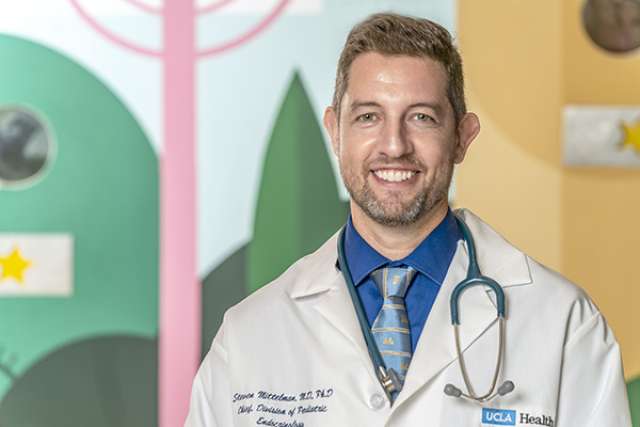Something as simple as a change in diet can potentially help to increase the cancer survival rate of obese children with acute lymphoblastic leukemia, the most common childhood cancer, according to a new study by UCLA scientists.
The research team, led by Dr. Steven Mittelman, chief of pediatric endocrinology at UCLA Mattel Children’s Hospital and member of the UCLA Jonsson Comprehensive Cancer Center, administered the chemotherapy drug vincristine to obese and non-obese mice with leukemia. Researchers discovered that if they switched the obese mice from a high-fat to a low-fat diet immediately before starting chemotherapy, the mice had a dramatically improved outcome. The mice on the low-fat diet had a five times higher survival rate than the mice in the high-fat diet group.
The success in mice supports what Mittelman, the senior author of the study, said could be a huge benefit for such a simple action.
“The most exciting thing to me about this study is the fact that this shows that a dietary intervention could potentially help us kill leukemia cells in children with acute lymphoblastic leukemia,” Mittelman said. “The current treatments for leukemia are very toxic, so finding a way to use a healthy diet, without increasing the toxicity of therapy to treat people with cancer, would be incredible.”
This research builds on past work by Mittelman that found that obesity made chemotherapy drugs much less effective in children with leukemia. After chemotherapy, obese children with leukemia relapse 50 percent more often than their lean counterparts. Recent studies have also found that one in three children with acute lymphoblastic leukemia was overweight or obese at diagnosis.
“During past research, the question that always came up was, is this something you can reverse and should we be putting our kids on a diet? So we decided to test that in the mice,” Mittelman said.
The mice that were switched to a low-fat diet had a dramatically improved survival rate of 92 percent, while the mice on the high-fat diet had a 17 percent survival rate.
“There are very few other things in life that you can do for one month that may have such a tremendous benefit, especially for your child who has cancer,” said first author Jonathan Tucci, a medical and doctoral student at Keck School of Medicine, University of Southern California, referring to the dietary changes.
The research team has begun to move its research to human trials at Children’s Hospital Los Angeles. The team has started a pilot study that tests the ability of a focused diet and activity intervention to reduce fat gain during chemotherapy for childhood acute lymphoblastic leukemia and to potentially improve survival rates.
The pilot study is led by Dr. Etan Orgel, an associate professor of pediatrics at Keck School of Medicine at USC, in collaboration with Mittelman, and is still recruiting participants.
Other authors include Ting Chen of the David Geffen School of Medicine at UCLA; Waseem Alhushki of the Kids Foundation, Las Vegas; Xia Sheng of Aptose Biosciences; and Yong-Mi Kim of USC’s Keck School of Medicine.
The research, which was supported by the National Cancer Institute, is published today in Cancer & Metabolism.



